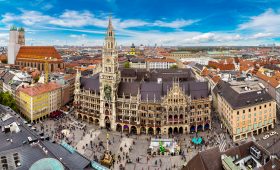San Agustin Church, Manila
History and Significance
San Agustin Church, located on General Luna Street in Manila, is a significant historical and architectural landmark. It is the oldest stone church in the Philippines, with its current structure completed in 1607. The church is a UNESCO World Heritage Site and a testament to the resilience of the Filipino people, having survived numerous earthquakes, wars, and natural disasters.
The first church on this site was built in 1571 using bamboo and nipa but was destroyed by fire in 1574. A second wooden structure also succumbed to fire in 1583. The present stone church, designed by Juan Macías, was constructed using adobe stones from nearby provinces and was completed in 1607. Despite the challenges of limited resources and skilled artisans, the church stands as a remarkable example of Baroque architecture.
San Agustin Church has played a pivotal role in Philippine history. It was the site where Spanish Governor-General Fermin Jaudenes prepared the terms for the surrender of Manila to the United States in 1898. During World War II, it served as a concentration camp and was the only church in Intramuros to survive the Battle of Manila in 1945.
Architecture and Interior
The church’s Baroque architecture is adorned with intricate carvings and stunning frescoes. Inside, visitors can admire the beautifully painted ceiling, which depicts scenes from the Bible and Philippine history. The church’s east bell tower, damaged in the 1880 earthquake, remains a testament to its enduring strength.
The adjacent monastery, rebuilt as a museum in the 1970s, offers additional insights into the church’s history and significance. The museum houses religious artifacts and artworks, providing a deeper understanding of the church’s cultural and historical context.
Visiting San Agustin Church
Getting There
Manila is accessible via Ninoy Aquino International Airport, which connects to major cities worldwide. From the airport, visitors can reach San Agustin Church by taxi or ride-sharing services. Public transportation options include jeepneys and buses, which offer affordable and convenient travel within the city.
The church is located in the historic district of Intramuros, making it easily accessible on foot from many nearby hotels and attractions. Exploring the area on foot allows visitors to appreciate the colonial-era architecture and vibrant atmosphere.
Best Time to Visit
The ideal time to visit San Agustin Church is during the dry season, from November to April, when the weather is warm and dry. To avoid crowds, consider visiting on a weekday, early in the morning, or later in the afternoon.
Local Transportation
Intramuros is best explored on foot, but for a unique experience, consider renting a traditional Filipino horse-drawn carriage, known as a “kalesa.” This mode of transportation adds a nostalgic touch to your visit and allows you to cover more ground while enjoying the sights and sounds of the city.
For those looking to explore beyond Intramuros, Manila offers a range of transportation options, including modern air-conditioned buses and the iconic jeepneys.




